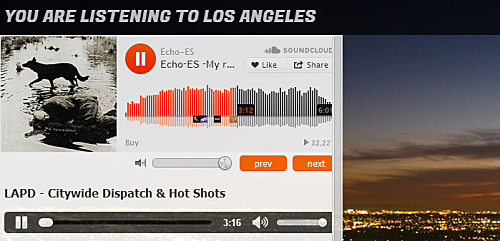Internet Histories | 24 February
This fortnight: youarelistening.to and the blurring definition of live music; Lean In's surface-deep revolution; lifestyles of the sociopathically rich and famous, and a warm welcome to new contributor Chris McIntyre.
This week:
Urban scanning
Stock photos versus feminsm | The plutocratic elite
And a warm welcome to Chris McIntyre.
Chris
Six-one-four, it’s a twenty-one-thirteen. We’ve located the mother, and the juvenile is inside the house. You can disregard any other cars we’re looking for.
A deep violin note—or is it a choir?—swells in the background, swoops out and the sound of falling rain gradually creeps in. Such sonic experiences aren’t unusual to on youarelistening.to, a site which superimposes the harsh crackles of police scanners over ambient electronic music.
You Are Listening To was created by Eric Eberhardt in 2010, on the night the San Francisco Giants won Major League Baseball’s World Series. It’s not uncommon for a city to break out in celebratory riot upon their team winning a Major League title, and San Franciscans took the bait. Sitting at home, Eberhardt saw links to the San Francisco Police Department scanner being shared on Twitter and while opening the links over background music, the idea for You Are Listening To was born.
You Are Listening To is a unique listening experience: it’s live music, but it’s not performed. It’s always different, but at the same time, to call the default offerings diverse would be massive overstatement. It’s a death knell for any solipsistic thought: endless compositions that straddle the dichotomous planes of calm and chaos. It’s the ethereal meeting the all-too-real, and after a few unfiltered hours of listening to actual people living actual lives you find yourself worn down, no longer listening but just hearing with numb passivity. Perhaps the most unsettling element is that, while you sit and tune in and out, there is every possibility you will be a bystander to a serious crime. The possibility of hearing people’s lives changed forever, or ending, in stereo, is a terrifying prospect.
Though a Kickstarter never really got started, the site has blossomed. You can now listen to nearly a hundred different cities’ police and airport scanners; you can also choose your own scanner, soundtrack and YouTube video. Eberhardt has previously mentioned the next steps could be putting recordings onto CD or vinyl, or into an art gallery installation, or to create mobile apps. For now though, a man wearing a white shirt and blue jeans has got into a Ford F-150 pickup, and he’s driving south. A grey Chevrolet rolls down an inter-state highway, far away. Officers pursue three teens, on foot. People live their lives, and it’s hard to stop listening.
Matt
A friend of mine works in market research, and often has to find the perfect stock image to illustrate a particular idea or feeling that her company wants to sell. Define the right search terms and you get some bemusing results, and she occasionally sends me some of the best/worst:
[caption id="" align="aligncenter" width="333"] The email this one came in reads “domestic violence is funny when it’s the man who’s assaulted! /sarcasm”[/caption]
In a way stock images are the purest reflection of the societies we inhabit; since they’re used to sell ideas and products, they wouldn’t exist if they weren’t considered valuable and relatable by advertisers. In the same way, they’re depressing as hell. Last week, news broke that Lean In had partnered with Getty Images to create a collection of 2500 images of women and girls in positions of power or leadership or simply enjoying themselves in ways that aren’t gender normative (I would strongly recommend hitting up that link and checking some of them out). There have been some criticisms that the images don’t go far enough in search of diversity, and businesses who don’t already care about these issues won’t bother using them, but to be honest I think it’s a positive and useful step.
It surprised me a little, because I don’t think much of the Lean In movement more generally. Being cis-male I occasionally feel a little out of my depth pontificating about issues at the heart of feminism, but then as someone from a very working-class background I feel pretty within my rights to suggest Lean In’s message sucks. Telling a group of marginalised people they individually have to work harder than the majority in order to find equality is not only unfair, it completely discounts the collective power inherent in any such group. There’s not enough space here for me to bitch about the way it only helps that class of woman with a relatively decent office job in the first place, so I’ll let a powerful piece by Joshunda Sanders do the talking:
While class is not emphasized or featured prominently in either of these books, economic status has a huge impact on whether women are willing or able to take risks at work. Generally, women still make 77 cents for every dollar a man makes. Things are unsurprisingly worse for women of color: African-American and Hispanic women make 64 cents and 54 cents to every dollar made by a non-Hispanic white man, respectively.
Meanwhile, Susan Faludi last year wrote a brilliant exploration of the interface between capitalism and feminism in order to understand what’s going on with Lean In. From the enfranchisement of good work for decent pay to the disenfranchisement of the beauty industry, with the endgame of a female Facebook exec telling women to lean in (but only via Facebook) – it’s an important read:
In the 1920s, male capitalists invoked feminism to advance their brands of corporate products. Nearly a century later, female marketers are invoking capitalism to advance their corporate brand of feminism. Sandberg’s “Lean In Community” is Exhibit A. What is she selling, after all, if not the product of the company she works for?
Kyle
I suppose you’d have to be naïve to still expect contrition from bankers. The nouveau riche of America infamously destroyed the world economy through a combination of arrogance, entitlement, greed, and an almost sociopathic disregard for others. The fallout is still being felt throughout the world: the Eurozone has been destabilised and unemployment and wealth inequality is still at record highs in many countries. Yet those who caused the crisis are anything but contrite: we hear a new heartless soundbite almost weekly. Tom Perkins, a Silicon Valley billionaire, recently compared campaigns to reverse income inequality to the mass murder of millions of Jewish people, suggested the rich should be able to have more votes than the poor, and complained that progressive taxation is “persecution”.
But, like their appetite for cash, it seems there is no upper bound on the depravity of these capitalists. Kevin Roose reports in NY Mag how he made his way into the meeting of a lavish — and secret —Wall Street fraternity, equal parts Wolf of Wall Street and Eyes Wide Shut. It includes this gem:
The neophytes – who had changed from their drag outfits into Mormon missionary costumes — broke into their musical finale: a parody version of “I Believe,” the hit ballad from The Book of Mormon, with customized lyrics like “I believe that God has a plan for all of us. I believe my plan involves a seven-figure bonus.”
“Fraternity” is misleading in that it brings to mind stoned collegiate dudebros doing kegstands in an American university, whereas the attendees here were elder millionaires and billionaires eating petit fours and wearing purple velvet moccasins. But, in other ways, it’s depressingly apt: Kappa Beta Phi was mostly male, dressed its inductees in drag in an attempt to humiliate them, and its brand of humour mainly comprised homophobic and sexist jokes. They were just as callous about cratering the global economy: in the opening speech, a jubilant Wilbur Ross (the “Grand Swipe”) boasted that Kappa Beta Phi has members “from every firm that has failed, and… from those who will fail in the future”.
Something toxic at the heart of this industry generates this sort of sociopathy. In a confessional to the New York Times, a former Wall Street trader described his greed, and the greed of his colleagues, as an “addiction”, comparing it to alcoholism and drug abuse. The comparison smacks of self-defensiveness, but how else to move on from a life consumed by money and mocking those who you destroy while getting it? I suspect it has something more to do with how money and self-worth are equated in modern society. In an episode of This American Life, Wall Street bankers explained why they survived the financial crisis:
Adam Davidson: And even if the government bails out your industry that failed, you still say it's because you're smarter.
Bar Patron 1: No. The government bailing out an industry was out of necessity for whatever the situation was. The fact that I benefited from that is because I'm smart. I took advantage of a situation. 95% of the population doesn't have that common sense. The only reason I've been doing this for so long is because I must be smarter than the next guy.
“I am rich because I am smart. And I am smart because, see: I am rich.” When wealth becomes intertwined with personal success, no wonder people like Sam Polk become addicted to its pursuit. And no wonder the rich are fearful of persecution. Because if you take away their money, what are they? Just a few dudebros doing kegstands in the back of a frathouse.






